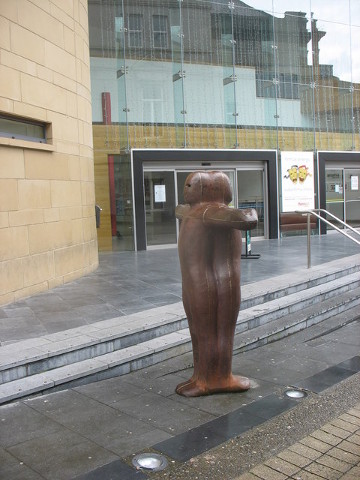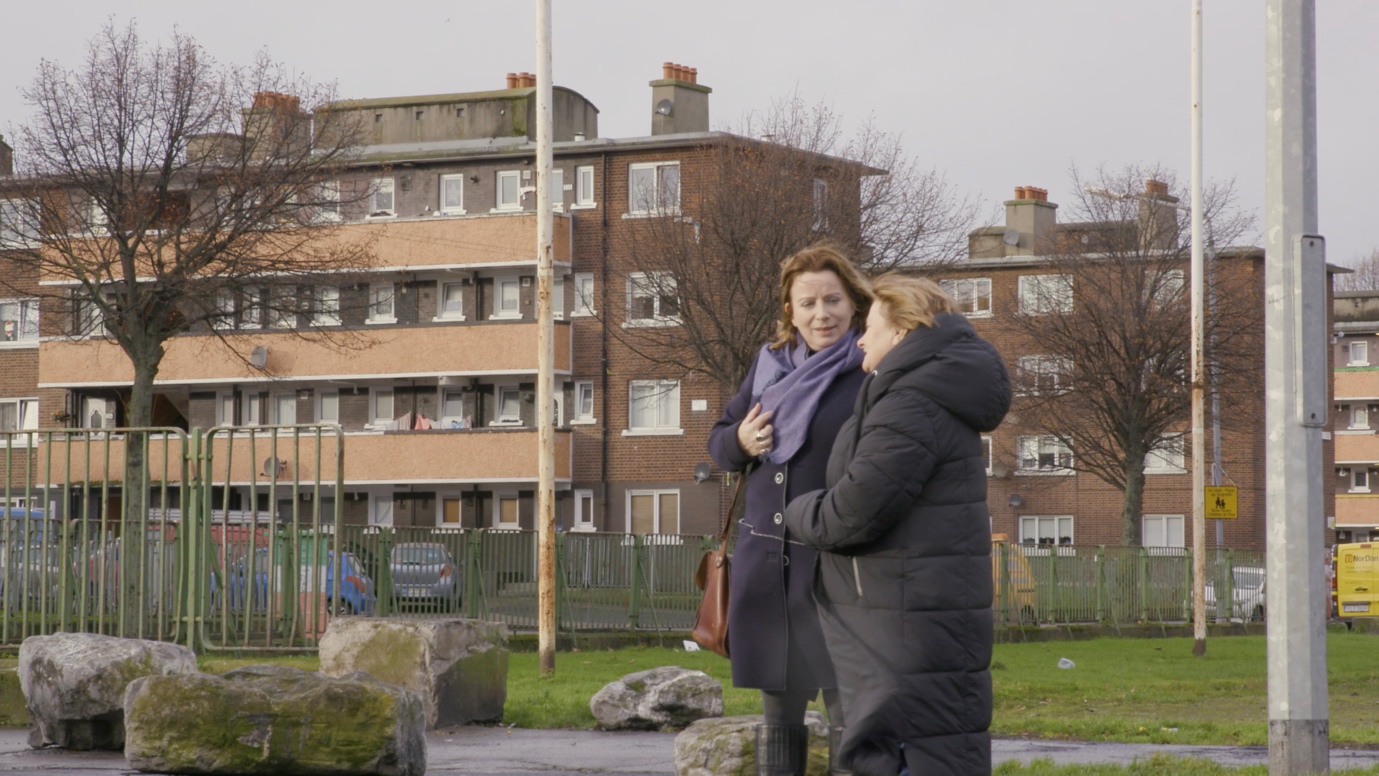Amplifying Change: Stories of Change from Irish History
Bláithín Ní Chatháin, Historical researcher and oral historian, Atlantic Philanthropies Archival Project
‘Amplifying change: A history of the Atlantic Philanthropies on the island of Ireland’ is a collaborative project between the Digital Repository of Ireland (DRI) based in Dublin and the Division of Rare and Manuscript Collections (RMC) at Cornell University Library, New York. The ‘Amplifying Change’ team based at DRI was granted access to the Atlantic Philanthropies Archive housed at RMC, enabling DRI to play a role in providing persistent access to grant documents and in contextualising the stories that surround significant social and cultural change with newly collected oral histories. The collaboration aims to build and disseminate a vibrant, sustainable, and openly accessible digital archive and online exhibition of the impact of the Atlantic Philanthropies grantees on the island of Ireland, consisting of select business records and new oral histories, that reflect Atlantic’s grantmaking philosophy, approach and impact in the Republic of Ireland and Northern Ireland.
‘Amplifying Change’ tells the untold story of the enormous impact of Atlantic Philanthropies’ generosity in Ireland. Atlantic Philanthropies was founded by Irish American Chuck Feeney, a successful businessman and billionaire who decided to give his fortune away believing 'there are no pockets in shrouds'¹.
There is a story in Conor O’Clerys’ biography The Billionaire Who Wasn’t: How Chuck Feeney Secretly Made and Gave Away a Fortune which I think best illustrates both the philosophy of Chuck Feeney and the Atlantic Philanthropies. Chuck grew up in an Irish American working-class Catholic household in New Jersey in the years following the Great Depression. He related to Conor O’Clery that despite how hard times were hard for the Feeney family, neighbours looked out for each other. One of the many examples of this generosity was the story of how Chuck’s mother used to give a lift to a neighbour who struggled with a chronic disease. Each day, as the neighbour walked slowly past the Feeney family home, Chuck’s mum used to run out and give him a lift to the bus stop where he got a bus to his job in New York City, insisting it was on her way, but it wasn’t she was just being a good Samaritan (O’Clery, 2).
Many years later, when visiting his ancestral home of Ireland in the 1980s and early 1990s, Chuck saw the devastation caused by high unemployment, emigration and the Troubles. Books with depressing titles like No One Shouted Stop: Death of an Irish Town or Last One Out, Turn off the Lights glared at graduates Dublin airport’s bookshop as they waited to board flights to jobs in Europe, New York and Boston. As Fintan O’Toole famously wrote in 1994 in his ominously titled book, Black Hole Green Card: The Disappearance of Ireland ‘there was no longer an Irish nation just a scattered people who still hold a country in their heads’ (O, Toole, 23).
In my role as historical researcher and oral historian for the Atlantic Archives project, I’ve spent eighteen months researching documents and interviewing wonderful individuals for the ‘Amplifying Change’ project. I was struck by how in our darkest days, Chuck Feeney saw our potential. Chuck and Atlantic Philanthropies were inspired to help out and make philanthropic investments in communities, education and human rights and reconciliation projects all the time quietly, unassumingly.

The task facing me was greatly enabled by the wonderful archival framework of the records being sorted according to grantees and Atlantic’s thematic philanthropic areas of interest by both Digital Archivist Anja Mahler in DRI and Phoebe Lynn Kowalewski at the Atlantic Archives, Cornell University Library. In undertaking the hard task of deciding which projects among the many hundreds within the existing thematic collections of Communities, Human Rights and Education in the Atlantic Philanthropies Archive housed at Cornell University to include in the ‘Amplifying Change’ digital archive, I used a variety of historical methods. Firstly, a chronological and geographical approach was essential in the selection of material and oral histories to make a contribution to the broader history of Ireland from the early 1990s up to 2016, a period of massive economic, political and social change on the island of Ireland. For example, here you can learn how from the late 1990s Atlantic partnered with the Irish government to invest over $600million in Irish third-level education and research, building libraries, labs and funding researchers. The business records contained in the ‘Amplifying Change’ archive are important additions to the historical enquiry of how a country of high graduate emigration and unemployment in the 1990s became one of the world’s fastest-growing countries by 2004, needing not only Irish graduates to return but also skilled immigrant workers for its new high tech and scientific industries.
A sure sign of an emerging confident nation was that by 2005 Irish academics and writers wrote books delightfully titled, The Transformation of Ireland 1900-2000 by Diarmuid Ferriter or Preventing the Future: Why Ireland was Poor for so Long by Tom Garvin. With this in mind, I endeavoured to select a variety of micro-stories from various third level research projects to illustrate the macro-historical story of how the seeds of investment and innovative technological and biomedical industries were sown and to demonstrate some of the impacts that investment in research centres and postgraduate courses have had.
Without a doubt, Ireland’s economic transformation was also due in part to the ending of the thirty-year conflict on this island. This archive and oral histories provide material to explore how the role of Chuck Feeney and Atlantic and the Irish American involvement with Bill Clinton in the Irish Peace process which resulted in the Good Friday Agreement in 1998 Records and oral histories in the collection were selected to demonstrate the impact that Atlantic had from the Downing Street Agreement period. Oral histories from Atlantic funded NGOs and Civil Society groups tell stories of how welcome the support was to their peacebuilding projects, cross-community dialogues and human rights advocacy work.

The archives and oral histories of NGO and community activists tell of Atlantic’s impact on the social history of Ireland in their role in strengthening human rights by their investment in children’s rights, the disability sector and disadvantaged communities. For example, funding innovative family support, early school leaver projects or the Refugee Council of Ireland. They also played a role in supporting the journey of LGBTQ rights in Ireland from the decriminalising of homosexuality to the introduction of Marriage Equality in 2015.
The most enjoyable part of the project for me was the many meetings and visits I undertook in the Republic of Ireland and Northern Ireland while collecting oral histories from various NGOs and Atlantic funded organisations. I was privileged to meet with many wonderful social activists, educators and human rights workers who have spent their lives working to improve the lives of people in their communities. Their stories will hopefully make these documents come alive.

Chuck Feeney, as an Irish American, knows what communities and people remember is as important as what they have forgotten. I hope that our work here has made some small contribution to ensuring that the story of Feeney and Atlantic’s extraordinary contribution to Irish history and culture will be told and retold.

It is hoped also that this archive will help contribute to greater knowledge of the enormous difference that the generosity and spirit of hope that Atlantic bestowed, made on the island of Ireland. As many of the people that were interviewed outlined their concerns about future funding for their NGOs, it is also hoped that the ‘Amplifying Change’ project will also serve as a resource/ learning tool for others interested in philanthropic investment in Ireland and see the impact even small donations can make to improving society and people’s lives.
References
O’Clery, Conor. 2008. The Billionaire Who Wasn’t: How Chuck Feeney Secretly Made and Gave Away A Fortune.
O’Toole, Fintan. 1994. Black Hole Green Card: The Disappearance of Ireland.
¹ https://www.atlanticphilanthropies.org/chuck-feeneys-story
